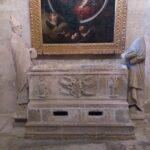St. Ado of Vienne
Saint Ado of Vienne
When he lived: Ado of Vienne lived from 800 to 875 AD.
Where he lived: Ado of Vienne lived in the city of Vienne, which is located in present-day France.
Notable world events during the time of his life:
- Coronation of Charlemagne (800 AD): Charlemagne, also known as Charles the Great, was crowned as the Emperor of the Carolingian Empire by Pope Leo III, marking a significant moment in European history.
- Viking Raids (9th century AD): The Vikings, seafaring Norse warriors, conducted raids and invasions on various parts of Europe during Ado’s lifetime, causing significant political and social disruptions.
- Treaty of Verdun (843 AD): The Treaty of Verdun marked the division of the Carolingian Empire among Charlemagne’s grandsons and laid the foundation for the formation of modern-day France, Germany, and Italy.
His patronage:
Ado of Vienne is recognized as the patron saint of gardeners and specifically the protector of vineyards due to his efforts to promote viticulture and improve winemaking during his time as the Archbishop of Vienne.
Intelligent, bold, and humble are some of the adjectives that best describe the saint of the day. This ninth-century scholar and historian commanded the attention of Popes and Kings for his outstanding virtues and piety.
Noble Beginning
Ado was born on January 1, 800, into one of the most wealthy and aristocratic families in Sens, present-day north-central France. His parents sent him off to a Benedictine monastery reputed to be highly disciplined and versed in education, seeking the best for their son.
At the Ferrieres Abbey in France, young Ado was under the tutelage of the famous Abbot Lupus. Ado, being intelligent and good with his studies but still humble, had the attention and admiration of his teachers.
Being an outstanding youth armed with nobility and excellent education, many people expected and urged Ado to take up a career in one of the many fields deserving of a person of his standing in society.
But Ado chose a very different path.
Dumping Nobility
Ado renounced his inheritance and joined the monastic life at Ferrieres Abbey, becoming a Benedictine monk. Later, at the request of Abbot Marcward to the Ferrieres, Abbey Ado was transferred to Prum near Trier, Germany.
At Prum, Ado was charged with the teaching of the sacred sciences. He excelled in whatever he did, and his holiness earned him envy from other monks. When abbot Marcward died in 853, some brothers conspired and chased Ado out of the monastery.
Ado moved to Rome, where he spent about five years as a pilgrim visiting the tombs of the apostles. He later moved to Ravenna, Italy, where he spent time gathering hagiographical materials.
He found an old copy of the Roman martyrology, which he used to write a new version published in 858.
Ado went back home to France and settled in Lyon, where he was welcomed by Archbishop Remigius (St.
Archbishop of Vienne
At Lyons, Ado served as the parish priest of St.Romain. His consistency and sincerity are always reflected in his work.
In 859, Ado was appointed Archbishop of Vienne in Lortharingia by Pope Nicholas I and was consecrated in 860. Ado knew the obligations of his office and discharged them with the utmost courage and in favor of no one but God.
As bishop, he sat in many councils and held several reforms at Vienne. Notably, his reform focused on the moral laxity and decadence among the clergy and the faithful. Ado raised the bar by leading by example. The prayer life and ethical practice of the church in Vienne shot up.
As Shepherd of Vienne, he believed in the saying that the “body needs both physical and spiritual food.” Ado did not only concern himself with the spiritual needs of his sheep. He cared for the well-being of the poor. At his expense, hospitals were raised for the reception and comfort of the needy.
A Lone Voice at the Council
In 862, King Lothair II of Lotharingia divorced his legally wedded wife Theutberga to marry his mistress Waldrada. To lend credence to his actions, he bribed the bishops and clergy who would be sitting at a council set up by Pope Nicholas I to investigate his divorce.
When Metz’s Synod (council) was held in 863, they tendered false documents supporting King Lothair II.
The only different voice at the council was Bishop Ado of Vienne. Ado set off to Rome to give the correct report to the Pope. On investigation, Pope Nicholas denounced the board of Metz and its ruling ,describing them as not being worthy of the name synod and comparing them to a brothel.
For his piety and virtues, Ado won the admiration of Pope Nicholas I and his successor, Pope Adrain 11, as well as the kings Charles the Bald and Lewis of Germany. The kings are inclined to take his advice.
Farewell Ado
Ado remained in Vienne, serving God and people, until it pleased the good Lord to call him home to himself on December 16, 875.
His feast day is December 16, the date of his death.
5 Interesting Facts About St. Ado of Vienne
- A fantastic historian, Ado wrote many books and authored the lives of
of St.Desiderius, a martyr of the faith, and St. Theuderius, a
hermit and abbot of the 6th century - Seen a saint with a great combination of humility, courage, and
intelligence? Ado of Vienne had a good dose of both. No matter how
His accomplishments flew, but he remained very humble. - He never took his eyes off his goal for 15 years and 3 months as
Archbishop of Vienne. Till today, he is honored in the church of
Vienne. - Ado always starts his preaching by saying, “Hear the eternal
truth that speaks to you in the gospel Hear Jesus Christ, who
said to you “. He was never afraid of telling the truth the way
it is. - Just like Paul had said to the Corinthians in 1 Corinthians 11:1, “
“Imit me then, just as I imitate Christ.” In the same way, Ado’s
Life speaks to the Viennese. He gave power to his words by
leading by example.
Prayer to St. Ado of Vienne
There is no official prayer to St. Ado of Vienne.
St. Ado of Vienne, pray for us.



